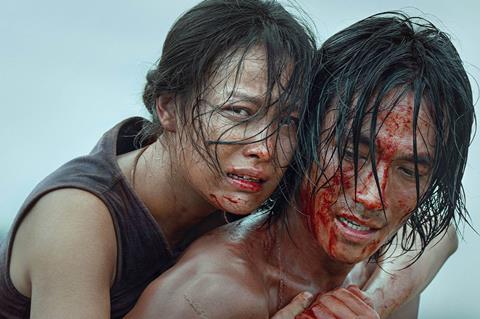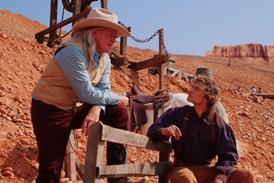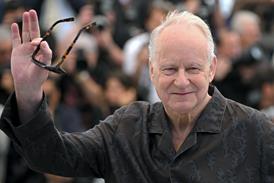Zhu Yilong turns this World War II true story into an action-hero’s journey

Dirs. Guan Hu, Fei Zhenxiang. China. 2025. 133mins
Guan Hu and Fei Zhenxiang’s summer blockbuster contender Dongji Rescue takes the Lisbon Maru incident that occurred off the coast of China during World War II as the basis for a rousing spectacle, but in doing so arguably strays too far from historical sources. This event was recently excavated by Fang Li’s documentary The Sinking Of The Lisbon Maru (2024), which chronicled in exacting detail how a Japanese cargo ship carrying prisoners of war was torpedoed by an American submarine, with hundreds of drowning captives saved by selfless Chinese fishermen from the nearby Dongji Island. As indicated by its title, Dongji Rescue tells the story from the Chinese perspective with the islanders initially unwilling to intervene but ultimately guided by their code: “Those in peril at sea must be saved”. Yet it also fictionalises history in a manner that may well be deemed entirely unnecessary by those now familiar with the harrowing tragedy.
The extensive underwater sequences are simultaneously visually gorgeous and suspenseful
These creative liberties could be a factor in the film’s underwhelming estimated $30 million domestic opening weekend. Local audiences are still flocking to Shen Ao’s wartime true story Dead To Rights, now in its third week of release, which has been praised for its authentic depiction of citizen resistance during the Nanjing Massacre. This means that Dongji Rescue won’t come close to replicating the success of co-director Hu’s previous military epic The Eight Hundred, which tallied $461 million to become 2020’s second-highest global grosser. If an overseas release throughout August is unlikely to create major box-office waves, reasonably taut pacing and several bravura set pieces should give Dongji Rescue streaming viability.
In October 1942, most of China is under Japanese control, including Dongji Island in the far eastern region of Zhoushan. The island’s inhabitants have been forbidden by the Japanese authorities from taking their boats out, reducing these seafarers to self-described “turtles”. This restriction has so infuriated rebellious young fisherman Abi (Zhu Yilong) that he intends to leave for Shanghai with his lover Ahua (Ni Ni), who is the foster daughter of stoic island patriarch Old Wu (Ni Dahong).
The isolated community is pulled into an international incident when British POW Thomas Newman (William Franklyn-Miller) is found floating nearby after being blown out of a torpedoed Japanese ship. Newman is harboured by Abi’s brother Adang (Wu Lei) with assistance from alcoholic school teacher Chen (Chen Minghao). Japanese troops soon arrive to retrieve Newman; they also take three Chinese hostages, including Adang, to guarantee compliance with their plan to leave the ship to sink. It is while trying to spring his brother that Abi discovers a shipload of malnourished POWs trapped on a waterlogged vessel.
Budgeted at $80 million with IMAX cameras utilised for underwater photography, Dongji Rescue is a magnificent production with Hu (in partnership with co-director Fei) honing the technical know-how demonstrated with The Eight Hundred on a similarly grand scale but against a different wartime backdrop. The extensive underwater sequences are simultaneously visually gorgeous and suspenseful, while painstaking recreations of the island village and the Lisbon Maru pay dividends in terms of scale, with the hellishly-lit hold of the ill-fated cargo ship constituting a gigantic coffin. The eventual rescue packs a kinetic wallop as this logistically complex sequence reaches a crescendo once the sinking ship causes a whirlpool. It’s a triumph of staging that thrillingly blends physical and digital elements. First-rate editing by Yang Hongyu and Li Weiwen ensures a sense of spatial clarity amid the escalating chaos, while Atli Orvarsson’s score provides a thunderous accompaniment.
However, the form of heroism primarily on display is problematic. The Lisbon Maru incident is an example of collective civilian action, but Dongji Rescue seeks to weave the traditional hero’s journey into these events. After establishing that Abi and his brother are descendants of pirates rather than born islanders, the film transforms Abi into a nautical superman who can handily tackle Japanese aggressors. Perfectly tanned and impressively toned with tousled hair flowing in movie-star fashion, Zhu confidently asserts himself as a rugged action lead following psychologically fractured turns in Lost In The Stars (2022) and Only The River Flows (2023). As one of Chinese cinema’s new breed of masculine protagonists, Abi exhibits a fiercely individualistic streak yet inspires others by gradually becoming a symbol of cultural virtues. But having the near-herculean efforts of an outsider stir the fishermen to act renders this community passive or even cowardly for much of the running time.
Although taking liberties with history is par for the course in popular cinema, the flagrant invention in Dongji Rescue turns what should be a tribute to pure humanism beyond borders into another full-blooded resistance/revenge story. Misguidedly seeking to stoke audience fervour, the screenplay fictionalises the occupation of the island and the threat of a massacre if POWs are hidden, while there are lashings of gore that stem from both rampant Japanese savagery and a desire for retribution. Regardless of the technical craftsmanship on display, such embellishments diminish the fundamental power of a unique story and place this loose cinematic retelling squarely within China’s typical war-movie output.
Production companies: Beijing Culture, Beijing Enlight Pictures, China Film Co., Shanghai Tao Piao Piao Movie & TV Culture, The Seventh Art Pictures, ZhuJiang Film Group
International sales: The Seventh Art Pictures, sjbfilm@gmail.com
Producer: Liang Jing
Screenplay: Chen Shu, Dong Runnian, Zhang Ji, Fei Zhenxiang, Zhou Chen
Editing: Yang Hongyu, Li Weiwen
Cinematography: Gao Weizhe
Music: Atli Orvarsson
Main cast: Zhu Yilong, Wu Lei, Ni Ni, Yang Haoyu, Ni Dahong, Chen Minghao, Wang Yiquan, Soji Arai, William Franklyn-Miller, Kevin Lee























